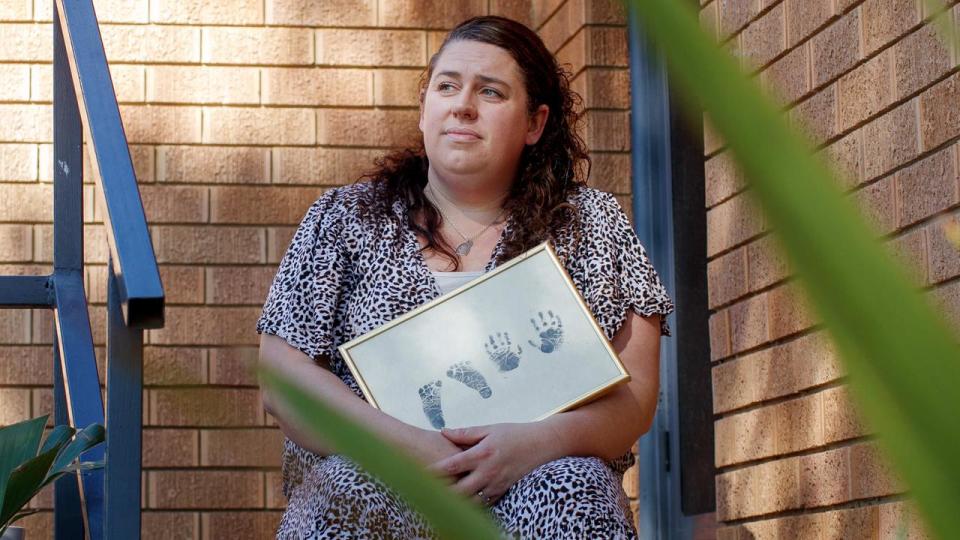Shocking 3-word question to grieving mum

Five hours after giving birth to her first child, Wollongong woman Naomi Bowden was forced to watch police officers put her in a “cold styrofoam box”.
Born on November 4, 2009, Bella Grace was delivered stillborn. Despite going through one of the “worst moments of my life,” Ms Bowden says it was her treatment by hospital staff at Wollongong Public Hospital that left her with more than a decade of psychological trauma.
The 41-year-old has made one of more than 4000 submissions to the NSW government’s inquiry into birth trauma, where she is set to give evidence to the upper house probe on Thursday.


She remembers being kept in the maternity ward overnight, listening to the sounds of crying babies and other mother’s giving birth.
The first time she saw Bella, Ms Bowden remembers being “rudely” directed to a small room, where her daughter lay intubated.
Another pain point was at her six week check-in appointment with hospital staff where she was asked by the doctor: “Where’s your baby?”
“I was hysterically crying by then. They said: ‘You just fell through some cracks in the system.’”
Prior to a follow-up meeting, the head midwifery consultant at the time sent her an email with links to several studies linking antidepressants – which Ms Bowden had been cleared to use – and adverse effects on unborn babies.
In emails seen by NCA NewsWire, the forwarded email read: “FYI, I have not read these yet so cannot give you feedback”.
“It just felt like I had failed. I had done this to my baby because I had to take that medication at the time to help me cope and get through my pregnancy,” said Ms Bowden.
“I was a grieving parent who was trying to put the pieces back together. Why (did I get sent) these unsupportive documents if they hadn’t even read them?”

To this day, Ms Bowden questions why she was treated with a lack of compassion and understanding in the hours, weeks and months after suddenly losing Bella.
While a complaint was filed with the Health Care Complaints Commission (HCCC) did not proceed to a formal investigation in relation to the medical care she received, Ms Bowden continues to be impacted as a result of her traumatic birth.
“I just feel like it’s so unfair because if so many things were dealt with differently, I would have been a different person,” she said.
“It’s impacted my overall health, even to this day.”
While she feels “nervous” at sharing the story publicly at the inquiry, she hopes this time she’ll be heard.
“I know I keep saying they need to do better but if there’s trauma involved there needs to be a plan,” she said.
“You can’t keep traumatising the person over and over and over, because then you’re impacting someone’s quality of life.”
Inquiry shining a light on ‘avoidable harm’
After the inquiry’s first public hearing on Monday, the NSW upper house committee will hear from women with lived experience, as well as advocacy groups and representatives from local hospitals.
The regional hearing was convened after postcode analysis of the 4000-plus submissions revealed a significant number originated from the Wollongong area.
A second regional hearing will occur at Wagga Wagga in December this year, where dozens of complaints to the HCCC from mums who gave birth at Wagga Wagga Base Hospital triggered the inquiry.
Committee chair, and Animal Justice Party MP Emma Hurst said the inquiry highlighted the rates of women coming forward and sharing their stories of “avoidable trauma”.
“System-caused trauma is very different than having a difficult birth with the best possible care. This really highlights that we need whole-of-system reform to address any avoidable harm that are happening to women,” she said.
“The brave women that have come forward to give their story are paving the way for change in the space.”

NSW Health Minister Ryan Park said he was “committed to ensuring women across NSW have access to respectful, evidence-based maternity care”.
“The stories and experiences that we’re hearing through this inquiry are harrowing and difficult, but we must listen and we must learn,” he said.
“It’s important we know more about the causes and factors contributing to birth trauma and its impact on women and their families.
“Women should have confidence in the maternity care provided in NSW.”
While NSW Health can’t comment on individual cases, Illawarra Shoalhaven Local Health District’s chief executive, Margot Mains said they had been actively working to improve their maternity services, and would continue to collaborate with community advocacy groups to meet the needs of women and their families.
“This inquiry provides us with another important opportunity to hear from women who are willing to share very personal experiences to help contribute to sustainable improvements to maternity services,” she said.
“The submissions and hearings will support our continuing service redesign and will allow us to use the voices of women and families to ensure that the journey we are undertaking creates a service that suits local needs and expectations.”


